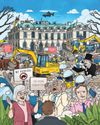
IN 1963, Walter Gadsden, 15 years old, was attacked by a police dog during a protest on the streets of Birmingham, Alabama. The moment was captured by Bill Hudson of the Associated Press. His photograph was later said to have brought the world to the side of the civil rights movement—a grand claim but not an unreasonable one, given both the photo’s mass-circulation and the meanings ascribed to it by white audiences.
Gadsden was a “frail Negro,” in one description; full of “saintly calm,” in the words of Diane McWhorter, paraphrasing the photographer’s editor. The writer Paul Hemphill, in his memoir of growing up in Birmingham, saw a “thin well-dressed boy seeming to be leaning into the dog, his arms limp at his side, calmly staring straight ahead as though to say, ‘Take me, here I am.’” Hudson’s photo offered a drama of wholesome nonresistance, with Gadsden in the role of a martyred innocent.
But something was obscured in that narrative, as Martin Berger argues in Seeing Through Race: A Reinterpretation of Civil Rights Photography. The white gaze skipped right over the signs of Gadsden’s resistance— the hand on the cop’s arm, the left knee thrust into the dog’s chest. These details did not fit with the prevailing picture of the struggle for civil rights. What white people saw instead was Black passivity. In Gadsden they saw a vulnerable boy who, like Black people throughout the South, was in need of white help. The photo may have drawn sympathetic white liberals to the cause of racial justice, but it did so, Berger writes, on terms that allowed them to feel secure and magnanimous, as if they were “bestowing rights” on Black people.
Diese Geschichte stammt aus der July/August 2021-Ausgabe von Mother Jones.
Starten Sie Ihre 7-tägige kostenlose Testversion von Magzter GOLD, um auf Tausende kuratierte Premium-Storys sowie über 8.000 Zeitschriften und Zeitungen zuzugreifen.
Bereits Abonnent ? Anmelden
Diese Geschichte stammt aus der July/August 2021-Ausgabe von Mother Jones.
Starten Sie Ihre 7-tägige kostenlose Testversion von Magzter GOLD, um auf Tausende kuratierte Premium-Storys sowie über 8.000 Zeitschriften und Zeitungen zuzugreifen.
Bereits Abonnent? Anmelden

HOG WILD
The scandalous reason meat prices have skyrocketed

ALL WALKS
Limiting cars in cities can help disabled people, too.

REMIGRATION
How Trumpism is following the far right in Europe toward mass expulsion of immigrants

SETTLING THE SCORE
A pop psychology book is considered the definitive trauma text. But what if it's leading survivors down the wrong path?

Positive Spin
People with e-bikes drive less, pollute less, parkinglots-and that's only part of why cities and states are embracing them with gusto.

Cradle and All
The devastating cost of Utah's thriving adoption industry

THE BILLIONAIRE WHO NEARLY BROKE NEWPORT
TRUMP MEGADONOR STEPHEN SCHWARZMAN'S EXTREME MANSION MAKEOVER IS DRIVING HIS NEIGHBORS NUTS.

THE SECRET PLAN TO STRIKE DOWN US GUN LAWS
AND THE COP-TURNED-PASTOR AT THE CENTER OF IT ALL

GOOD NIGHT AND GOOD LUCK
Election Day inside a bustling broadcast newsroom that no longer exists

MASTER OF DISASTER
Trump won’t confront the climate crisis. He’ll feast off it.